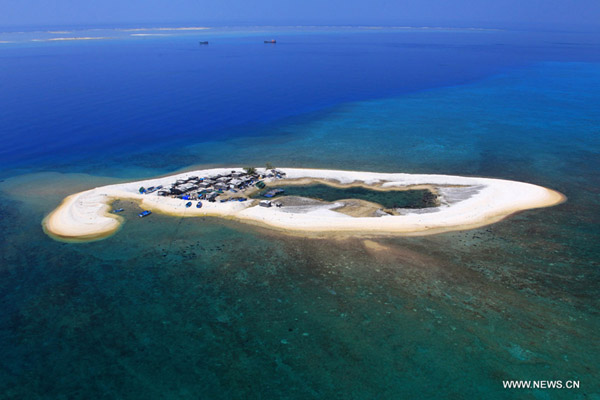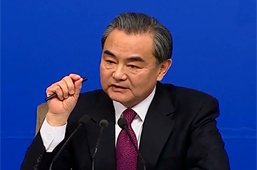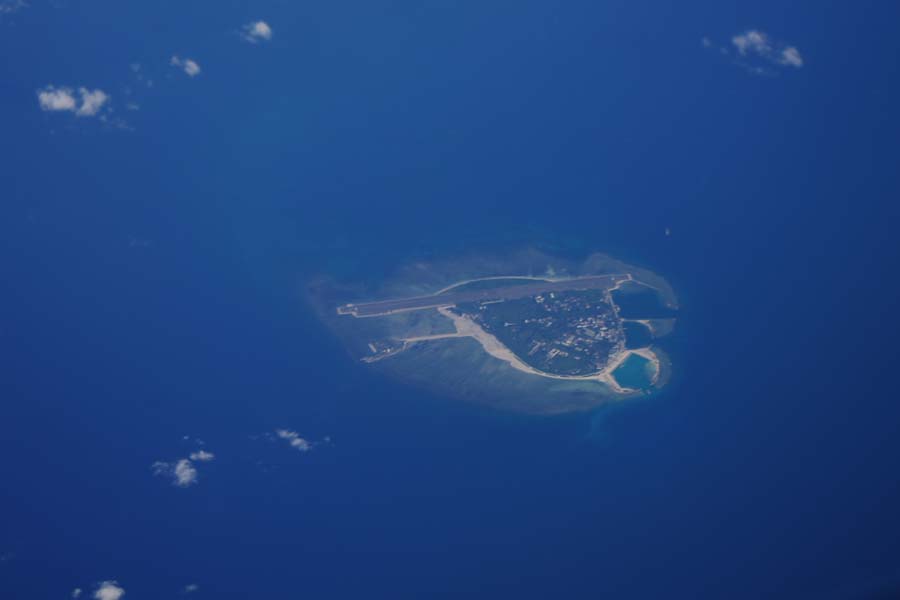
This bird eye view shows the coral reefs in China's Xisha Islands, South China Sea. [Photo/Xinhua]
This year marks the 20th anniversary of the signing of the Declaration on the Conduct of Parties in the South China Sea. In 2002, representatives of the governments of China and the members of the Association of Southeast Asian Nations signed the DOC in Phnom Penh, Cambodia, the first political document for China and the ASEAN countries to deal with the South China Sea issue at the regional level.
In the past two decades, although the situation in the South China Sea has been disturbed by various factors, the maritime disputes between the parties have been properly managed within the framework of the DOC, and no serious conflict has broken out. In 2016, the Philippines' arbitration case in the South China Sea directly challenged the provisions of Article 4 of the DOC, causing regional tensions in the South China Sea. However, not long after, the foreign ministers of China and ASEAN countries issued a joint statement on the full and effective implementation of the DOC, reaffirming the important role of the DOC in maintaining regional peace and stability, and pushing the resolution of the South China Sea issue back on track.
The signing and implementation of the DOC has effectively enhanced the political mutual trust between China and the ASEAN countries, and laid a solid foundation for the in-depth development and comprehensive upgrading of China-ASEAN relations. The concluding and signing of the DOC itself was an important measure to establish mutual trust between China and the ASEAN countries, and a true portrayal of the continuous development and maturity of China-ASEAN relations. The purposes, objectives, principles and path set out in the DOC reflect the awareness of rule-based governance, and the political wisdom of China and the ASEAN countries to exercise self-restraint in order to manage differences.
The DOC provides an important platform for China and the ASEAN countries to carry out practical maritime cooperation. The DOC clearly states that before the disputes are resolved, all parties should seek ways to build mutual trust through strengthening practical cooperation. Over the years, China and the ASEAN countries have made important achievements in this regard: They have issued a leaders' declaration on environmental protection cooperation, established a hotline for senior diplomats to respond to maritime emergencies, promoted the application of the rules for accidental encounters at sea in the South China Sea, and held a series of seminars, training courses and projects on topics such as marine disaster prevention and mitigation, marine ecological environment and monitoring, marine scientific research, as well as enhancing cooperation among maritime law enforcement agencies.
In 2013, China and the ASEAN countries launched their consultations on the Code of Conduct for the South China Sea, a key step for countries in the region to move toward the governance of the South China Sea by rules. In 2017, all parties agreed upon the framework of the Code of Conduct, which further demonstrates the willingness and determination of China and the ASEAN countries to manage and control disputes and actively promote consultations on the Code of Conduct. Since then, the parties have successfully launched consultations on the text of the Code and have advanced the consultation in a flexible and pragmatic manner since the outbreak of the COVID-19 pandemic. From the DOC to the Code of Conduct, the common vision of all parties is to further concretize and standardize the rules of conduct established in the DOC, by making the Code of Conduct more substantive and effective as an enhanced and upgraded version of the DOC. The continued progress of the Code of Conduct consultations will help establish a success story for the world that even if there are disputes, the parties concerned can still exercise self-restraint and practical cooperation, and manage their disputes by rules.
As a party to the DOC and a responsible regional power, China has adhered to the important role of the DOC as an anchor for peace and stability in the South China Sea. Looking to the future, China and the ASEAN countries should take the 20th anniversary of the signing of the DOC as an opportunity, adhere to the spirit and principles of the DOC, view differences properly, reject interference resolutely, manage incidents in a peaceful manner, jointly build maritime order by rules, and work together to keep the South China Sea a sea of peace, friendship and cooperation.
The author is an associate professor at the Institute of Asian Studies and director of the Research Center for Boundary and Ocean Governance, China Foreign Affairs University.
The view don't necessarily reflect those of China Daily.
If you have a specific expertise, or would like to share your thought about our stories, then send us your writings at opinion@chinadaily.com.cn, and comment@chinadaily.com.cn.



 Overview
Overview Resources & Environment
Resources & Environment



 QQ 好友
QQ 好友 微信好友
微信好友 易信好友
易信好友 QQ空间
QQ空间 朋友圈
朋友圈 百度空间
百度空间